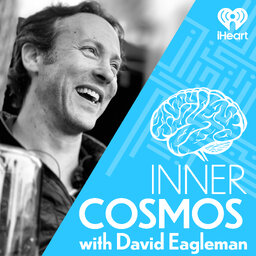Ep9 "What does eating that cookie have to do with the hero of the Trojan war?"
We all have goals, and we all face temptations that get in the way. So what's happening in the brain when we act in a manner that isn't in accordance with who we want to be? Computers don’t have these problems, but being human can be tough. In the previous two episodes we exposed the rivaling networks battling it out under the surface. Today we’re going to talk about the gap between what you intend to do and what you actually do when temptation is there.
In 1 playlist(s)
Inner Cosmos with David Eagleman
Neuroscientist and author David Eagleman discusses how our brain interprets the world and what that …Social links
Follow podcast
Recent clips

Ep138 "Why do our political brains mistake opinion for truth?" with Kaizen Asiedu
1:07:52

Ep137 "Do cures ever create the next crisis?" with Thomas Goetz
47:09

Ep136 "Why do we care about mattering?" with Rebecca Goldstein
41:31
 Inner Cosmos with David Eagleman
Inner Cosmos with David Eagleman